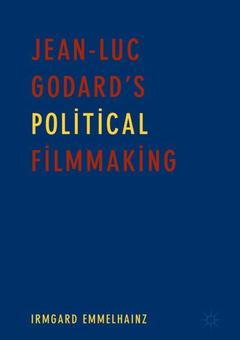Description
Jean-Luc Godard’s Political Filmmaking, 1st ed. 2019
Language: English
Subjects for Jean-Luc Godard’s Political Filmmaking:
Keywords
Militant cinema; Israel-Palestine; Thirdworldism; Representation; Godard; Political films; French cinema; political filmmaking; political cinema; political directors; militant filmmaking; Dziga Vertov; aesthetic-political; dialectical materialist; dialectical image; Le Petit soldat; Adieu au langage
327 p. · 14.8x21 cm · Hardback
Description
/li>Contents
/li>Biography
/li>Comment
/li>
This book offers an examination of the political dimensions of a number of Jean-Luc Godard?s films from the 1960s to the present. The author seeks to dispel the myth that Godard?s work abandoned political questions after the 1970s and was limited to merely formal ones. The book includes a discussion of militant filmmaking and Godard?s little-known films from the Dziga Vertov Group period, which were made in collaboration with Jean-Pierre Gorin. The chapters present a thorough account of Godard?s investigations on the issue of aesthetic-political representation, including his controversial juxtaposition of the Shoah and the Nakba. Emmelhainz argues that the French director?s oeuvre highlights contradictions between aesthetics and politics in a quest for a dialectical image. By positing all of Godard?s work as experiments in dialectical materialist filmmaking, from Le Petit soldat (1963) to Adieu au langage (2014), the author brings attention to Godard?s ongoing inquiry on the role filmmakers can have in progressive political engagement.
Irmgard Emmelhainz is an independent writer and scholar based in Mexico City. She is the author of The Tyranny of Common Sense: Mexico's Neoliberal Reconversion (2016; in Spanish) and The Sky is Incomplete: Travel Chronicles in Palestine (Forthcoming; in Spanish).

